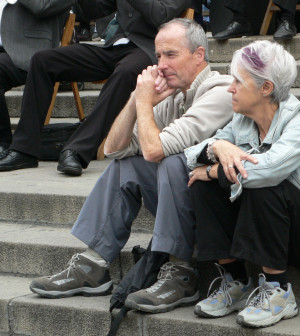- Could Your Grocery Store Meat Be Causing Recurring UTIs?
- Are You Making This Expensive Thermostat Error This Winter?
- Recognizing the Signs of Hypothyroidism
- 10 Strategies to Overcome Insomnia
- Could Artificial Sweeteners Be Aging the Brain Faster?
- Techniques for Soothing Your Nervous System
- Does the Water in Your House Smell Funny? Here’s Why
- Can a Daily Dose of Apple Cider Vinegar Actually Aid Weight Loss?
- 6 Health Beverages That Can Actually Spike Your Blood Sugar
- Treatment Options for Social Anxiety Disorder
A ‘Purpose in Life’ May Extend Yours


Another study finds that having a sense of meaning and purpose in your life might do more than just give you focus — it might help you live longer, too.
The study, involving more than 9,000 British people averaging 65 years of age, found that those who professed to feeling worthwhile and having a sense of purpose in life were less likely to die during the more than eight years the researchers tracked them.
Over the study period, 9 percent of people with the highest levels of this type of well-being died, compared with 29 percent of those with the lowest levels, according to the report in the Nov. 7 issue of The Lancet.
The study comes on the heels of similar research published Monday in the Proceedings of the National Academy of Sciences. In that study, a team led by Eric Kim of the University of Michigan found that older adults with a strong sense of purpose in life may be particularly likely to get health screenings such as colonoscopies and mammograms.
The new British study was led by Andrew Steptoe, director of the Institute of Epidemiology and Health Care at University College London. His team found that, after taking other factors into account, people with the highest levels of “purpose in life” were 30 percent less likely to die during the study period, living an average of two years longer than those with the lowest levels.
“We have previously found that happiness is associated with a lower risk of death,” Steptoe said in a college news release. “These analyses show that the meaningfulness and sense of purpose that older people have in their lives are also related to survival. We cannot be sure that higher well-being necessarily causes lower risk of death, since the relationship may not be causal. But the findings raise the intriguing possibility that increasing well-being could help to improve physical health.”
Steptoe said that “there are several biological mechanisms that may link well-being to improved health, for example through hormonal changes or reduced blood pressure. Further research is now needed to see if such changes might contribute to the links between well-being and life expectancy in older people.”
Reviewing the Michigan study, James Maddux, university professor emeritus of psychology at George Mason University in Fairfax, Va., said the findings make sense.
“My guess is that there are at least two possible explanations for these findings,” he said. One is that people with a sense of purpose want to be around for a long time, and in good shape. “They take care of their health because they want to prolong a life — and a healthy life — that they find meaningful.”
Plus, Maddux noted, people who actively search for meaning in life may be generally better at setting goals and making plans, including health care decisions.
And Kim, the Michigan study’s lead author, said that there is still good news for people who lack a sense of purpose: “It can be increased,” he said.
Some studies have found that group therapy or less-formal techniques, like meditation, can help, according to Kim. And he said retired adults can find other activities to give their days direction and purpose, such as volunteering or taking classes.
Maddux agreed. “I think the take-away,” he said, “is that finding purpose and meaning in life has a lot of beneficial physical and psychological ‘side effects,’ beyond the good that may be done by meaningful activities themselves.”
More information
The U.S. Centers for Disease Control and Prevention offers healthy aging tips for older adults.
Source: HealthDay
Copyright © 2026 HealthDay. All rights reserved.










